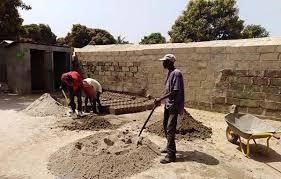By Nelson Manneh
A sharp increase in cement prices and ongoing supply shortages has brought construction activities across The Gambia to a near standstill, leaving many masons and contractors jobless and without income for months.
The price of a 50kg bag of cement, previously sold for about D350, has risen to between D475 and D500 in most retail shops. The hike has forced clients to halt construction projects, leaving skilled workers idle during what is traditionally the busiest period of the year for the building industry.
Aarafang Colley, a 52-year-old mason with over 20 years of experience, said he has not received a single contract since February.
“This is the only skill I have. I’ve been doing this since 2000, but now I’m home every day. Cement is too expensive. People have stopped building,” he said.
Colley, who supports a household of two wives and seven children, said that the lack of work has made it nearly impossible to meet his family’s daily needs.
“In 2022, I started managing my own contracts and hired younger masons to assist me. Since February this year, I’ve had no jobs to give them. Everyone says they’re waiting for prices to go down,” he said.
Construction in The Gambia typically peaks between November and May, but workers say this year has been marked by cancellations and inactivity. The rising cost of cement has led many clients to suspend projects indefinitely.
Abdoulie Mendy, a private contractor based in the West Coast Region, said he has also been affected. “Last year, I had several active projects and employed more than 20 youth. But this year, most projects have stopped and I’ve had to lay off workers,” he said. “Clients say they can’t afford cement.”
The scarcity has also hit retailers. Babucarr Cham, a cement dealer in Yundum, said he is preparing to shut down his business temporarily due to a lack of supply. “I have less than 15 bags in stock. I don’t want to restock at this price because when prices go up in this country, they rarely come down,” he said.
While some domestic manufacturers operate in the country, their production capacity is insufficient to meet demand. Industry sources say government efforts to protect local producers by increasing import duties and imposing restrictions have worsened the shortage. Importers argue that these policies are driving up prices and limiting the availability of cement in the market. The companies engaged in cement production argue that they can meet the demand.
The Cement Importers and Traders Association (CITA) has raised concerns about what it describes as an imbalance in policy decisions that favour local factories without addressing the existing production gap. Legal disputes between importers and the government are currently ongoing.
With no relief in sight, construction workers and traders are appealing to the authorities for intervention. They recommend that the government consider temporary tax relief or subsidies on cement imports to stabilise the market.
“If the government wants young people to take up skills like masonry, they need to make it sustainable,” Mendy said. “Without cement, there’s no work.”
Colley, now out of work for over three months, says the pressure is growing. “It’s hard. Every day my children ask me for food, and I have nothing to give them,” he said. “We need help. Cement is not a luxury — it’s our livelihood.”


















